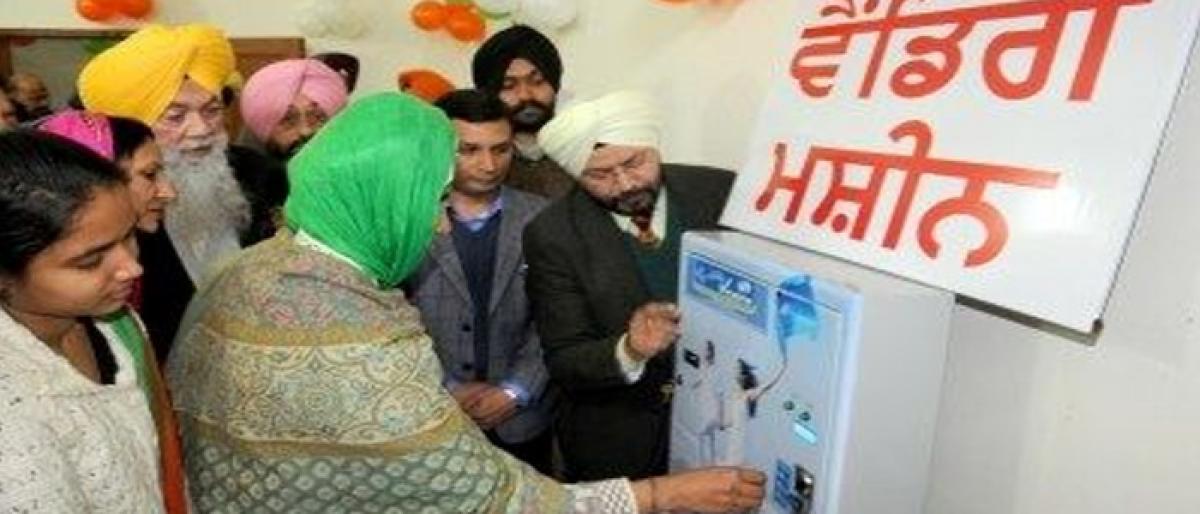Live
- President Droupadi Murmu Graces Koti Deepotsavam in Hyderabad
- South Korean court sentences ex-fiance of Olympic fencing medalist to 13-yr prison term
- Posani Krishna Murali Announces Exit from Politics
- Allu Arjun and Sreeleela to Ignite the Stage with Pushpa-2’s Special Song
- World Television Day 2024: From B&W Beginnings to Smart TVs and Their Role in Shaping Elections
- Bihar: Kaimur residents buy cheap medicines from Jan Aushadhi Kendras, thanks govt
- JMM confident of winning 59 seats in Jharkhand
- Jordan's govt approves draft budget law for 2025
- Football: Abdul Fatawu to miss remainder of season with ACL injury
- Bihar will get roads similar to US in four years: Nitin Gadkari
Just In

Awareness about the harm easily-accessible, plastic-based sanitary napkins have been causing to both health and the environment is spreading, but slowly. And helping the cause of better menstrual hygiene, many sanitary pad makers, NGOs and indigenous brands are turning towards natural products to produce sustainable pads.
Awareness about the harm easily-accessible, plastic-based sanitary napkins have been causing to both health and the environment is spreading, but slowly. And helping the cause of better menstrual hygiene, many sanitary pad makers, NGOs and indigenous brands are turning towards natural products to produce sustainable pads.
Organic cotton, banana or jute fiber, an deven clothes are now among the alternatives on offer to the sanitary pads sold by the MNCs in India.
But why do we need these alternatives?
Every plastic based sanitary pad has non-biodegradable content which takes around 500-800 years to decompose. Apart from the threat to the environment, medical experts have also voiced concern over possible pelvic infection due to repeated use of these easily available plastic pads.
One of the companies providing an alternative is Ahmedabad based Saathi, which was started in 2015 by graduates from MIT, Harvard and Nirma.
"We realised that there was a need for an alternative, and urban women were looking for different products because they were becoming aware of the consequences of plastic-based pads. The idea of using banana fiber came up and we decided to make sanitary pads based on it," Saathi co-founder Kristin Kagetsu.
Banana fiber comes from the stem of the banana tree, which after harvesting, is normally discarded. Saathi buys the stems from collectives of local farmers.
"After being disposed, Saathi's pads degrade within six months, which is 1,200 times faster than the MNC pads. Since our products are made of natural materials, Saathi pads provide an experience free of rashes and irritation," Kagetsu added.
Another sanitary pad maker, EcoFemme, based in Auroville, is also in the business of making eco-friendly menstrual products- they make cloth based pads using organic cotton.
"Our target is women aged 18-35. Our products are sold in rural areas through our 'Pads for Sisters' programme which offers women the opportunity to buy the pads at a reduced price," said Laura O'Connell from EcoFemme.
Anshu Gupta's Not Just Piece of Cloth (NJPC) was among the first to turn clothes into pads. For over a decade now, 'MyPad' has been selling its products in rural areas where there is little access to sanitary pads, and even in cities.
"In earlier times, clothes were used. But it was portrayed that clothes were unhygienic. Yes, they are, if not cleaned properly. We at Goonj first thoroughly clean the clothes, make them hygienic, make the pads and the distribute them among women, especially in rural areas said, Meenakshi Gupta from NJPC .
When will such products make it to every household?
"Frankly speaking, in rural areas women don't even have an idea about sanitary pads; so knowing about the existence of biodegradable sanitary napkins or organic pads or even hygienic clothes is very rare," Bothra, whose products are available on e-commerce platforms, explained.
He further noted that since the MNC-produced pads are easily available at low cost, women don't show much interest in investing money on the alternatives.
"There is a growing awareness, but there is a lot of work to do to make reusable options more widely known. We believe in informed choices; so we hope that more people in all areas of India, not just rural, will become aware of sustainable options and make a decision based on the fact that reusable products are better for health, the planet and our wallets," O'Connell commented.

© 2024 Hyderabad Media House Limited/The Hans India. All rights reserved. Powered by hocalwire.com







